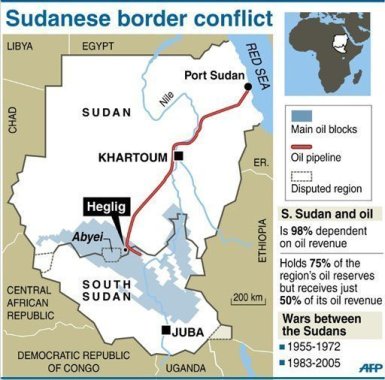Sudans’ security deal delayed by divergences over maps
June 5, 2012 (KHARTOUM) — Talks between Sudan and South Sudan over security issues were deadlocked Tuesday due to the failure of the two parties to agree on a map to define a buffer zone. The two parties suggest to work from different maps.

However, weeks before the start of the talks Sudan said opposed to a map prepared by the African Union mediators of the border because it included a fifth zone that had not been initially part of the four disputed locations.
Juba earlier in May announced an “an official map” including Heglig and other areas saying they were historically part of the South but Khartoum annexed them because they have resources.
On Tuesday, the delegations of the two sides at the level of the Joint Political and Security Mechanism proposed to work from a map incorporating the non agreed “disputed areas” from both sides.
Juba’s delegation proposed to transform the disputed areas, as defined in the South Sudanese map, to a buffer zone but Khartoum delegation rejected the proposition.
The Sudanese delegation said it is committed only to the “maps of references” including that one adopted when Sudan acknowledged the independence of South Sudan and the maps used by the UNMIS during the interim period or the current UNMISS in South Sudan and UNAMID of Darfur, said Omer Dahab, spokesperson of the Sudanese delegation in the talks.
South Sudanese delegation refused the maps prepared by the United Nations missions saying it can not be the reference in talks because the UN draw it for different purposes and it should not be used in the current dispute between the two countries.
“We have not yet been able to agree on the line from which the safe demilitarized border zone is going to be drawn,” said South Sudan foreign Nhial Deng minister in statements to reporters during a break.
He however said he remained optimistic a deal could yet be reached.
The UN Security Council in a resolution voted unanimously on 2 May gave the two countries three months to reach a deal over the outstanding issues including border demarcation, Oil transportation fee and Abyei.
Delegations from the two sides are expected to meet Thursday for talks on Abyei. Dahab told the official SUNA that the deadlock on the security issues should not impede Abyei’s panel.
But he blamed Juba’s delegation for obstructing the security talks because they insist to include in the discussions issues like the lifting of the state of emergency on the border areas and the exchange of ambassadors.
In accordance with an agreement reached before the independence on 31 May 2011, a jointly patrolled demilitarized zone stretching 6 miles north and south from the 1956 boundaries would be established between the two countries.
The parties however failed to establish this buffer zone because it depends on the border demarcation. However the accusations of support to rebel groups and the occupation of Heglig motivated the international pressures on the two countries to enforce this deal.
(ST)
